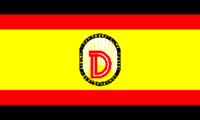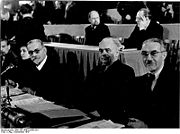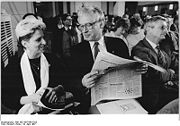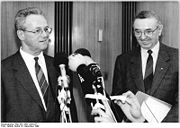
Liberal Democratic Party of Germany
Encyclopedia

Political party
A political party is a political organization that typically seeks to influence government policy, usually by nominating their own candidates and trying to seat them in political office. Parties participate in electoral campaigns, educational outreach or protest actions...
in East Germany. Like the other allied parties of the SED
Socialist Unity Party of Germany
The Socialist Unity Party of Germany was the governing party of the German Democratic Republic from its formation on 7 October 1949 until the elections of March 1990. The SED was a communist political party with a Marxist-Leninist ideology...
in the National Front
National Front (East Germany)
The National Front of the German Democratic Republic was an alliance of political parties and mass organisations in East Germany...
it had 52 representatives in the Volkskammer
Volkskammer
The People's Chamber was the unicameral legislature of the German Democratic Republic . From its founding in 1949 until the first free elections on 18 March 1990, all members of the Volkskammer were elected on a slate controlled by the Socialist Unity Party of Germany , called the National Front...
.
Foundation
The history of the party dates back to June 1946, when a group led by Waldemar KochWaldemar Koch
Waldemar Koch was a German liberal politician and economist.He was born in Bad Harzburg, Lower Saxony. Koch studied Economy and worked for years for AEG....
took the initiative in refounding German Democratic Party. At first there were some speculation of forming a united liberal party with the Christian Democrats, but the idea was abandoned soon and on July 5, 1946, the Liberal Democratic Party of Germany was officially founded.
It was first of all aimed at uniting Weimar Republic
Weimar Republic
The Weimar Republic is the name given by historians to the parliamentary republic established in 1919 in Germany to replace the imperial form of government...
-era members of the German Democratic Party, German People's Party
German People's Party
The German People's Party was a national liberal party in Weimar Germany and a successor to the National Liberal Party of the German Empire.-Ideology:...
and German National People's Party
German National People's Party
The German National People's Party was a national conservative party in Germany during the time of the Weimar Republic. Before the rise of the NSDAP it was the main nationalist party in Weimar Germany composed of nationalists, reactionary monarchists, völkisch, and antisemitic elements, and...
. Unlike the CDU
Christian Democratic Union (East Germany)
The Christian Democratic Union of Germany ) was an East German political party founded in 1945. It was part of the National Front with the Socialist Unity Party of Germany until 1989....
, the Liberal Democratic Party was firmly for private ownership and opposed to nationalization
Nationalization
Nationalisation, also spelled nationalization, is the process of taking an industry or assets into government ownership by a national government or state. Nationalization usually refers to private assets, but may also mean assets owned by lower levels of government, such as municipalities, being...
of important private enterprises. Among the new anti-fascist parties, Liberal Democratic Party was the most anti-communist at the time.
After internal fighting and under pressure from Soviet authorities, the first chairman Waldemar Koch
Waldemar Koch
Waldemar Koch was a German liberal politician and economist.He was born in Bad Harzburg, Lower Saxony. Koch studied Economy and worked for years for AEG....
was replaced with pro-Soviet Wilhelm Külz
Wilhelm Külz
Wilhelm Külz was a German politician . In 1926 he was interior minister of the Weimar Republic. After 1945 he took actively part in establishing the LDPD...
in November 1945.
In the last free election, of 1946, the Liberal Democrats finished third, behind the SED and the CDU. At the end of 1948, during the culmination of their opposition to the SED seizure of power, Liberal Democratic Party had more than 200,000 members, 23% of whom were younger than 25.
Unification attempts

Wilhelm Külz
Wilhelm Külz was a German politician . In 1926 he was interior minister of the Weimar Republic. After 1945 he took actively part in establishing the LDPD...
and Theodor Heuss
Theodor Heuss
Theodor Heuss was a liberal German politician who served as the first President of the Federal Republic of Germany after World War II from 1949 to 1959...
(representing Western liberals) acted as co-chairman. Such undertakings failed quickly, owing to Külz's participacion in the SED
Socialist Unity Party of Germany
The Socialist Unity Party of Germany was the governing party of the German Democratic Republic from its formation on 7 October 1949 until the elections of March 1990. The SED was a communist political party with a Marxist-Leninist ideology...
-sponsored German People's Congress for Unity and True Peace. Although the LDP's Vorstand or leadership criticized that participation, it refused to take any further steps demanded by the West German liberals.
The failure of unification became imminent when on the session of the united leadership of DPD that took part on January 18, 1948 and which Külz refused to attend, Theodor Heuss
Theodor Heuss
Theodor Heuss was a liberal German politician who served as the first President of the Federal Republic of Germany after World War II from 1949 to 1959...
argued that Liberal Democrats' unwillingness to take any measures against Külz proved their commitment to 'the Russian conception of German unity'. Upon in, Arthur Lieutenant, the spokesman of LDPD on the matter, declared that under those circumstances and concerning reproaches laid against East German liberals, any co-operation had been made impossible. This was in fact the end of DPD.
A Blockpartei

National Front (East Germany)
The National Front of the German Democratic Republic was an alliance of political parties and mass organisations in East Germany...
(Blockpartei) it jettisoned its original ideology, acting as a "helpmeet" to the Communist SED
Socialist Unity Party of Germany
The Socialist Unity Party of Germany was the governing party of the German Democratic Republic from its formation on 7 October 1949 until the elections of March 1990. The SED was a communist political party with a Marxist-Leninist ideology...
. Along with the LDPD there was another block party the NDPD
National Democratic Party of Germany (East Germany)
The National Democratic Party of Germany was an East German political party that acted as an organisation for former members of the NSDAP, the Wehrmacht and middle classes...
, which appealed to almost the same social groups.
Manfred Gerlach
Manfred Gerlach
Manfred Gerlach was a German jurist and politician . He served as the acting Chairman of the Council of State and was thus head of state of East Germany from 6 December 1989 to 5 April 1990.-Early life:...
was the Chairman of the Liberal Democratic Party from 1967 to his resignation in 1990. The central newspaper of LDPD used to be daily Der Morgen
Der Morgen
Der Morgen was a daily newspaper published in the GDR. Der Morgen was the central organ of the Liberal Democratic Party of Germany. It was published from August 3, 1945 on, six times a week...
.
Originally its used the name Liberal Democratic Party (Liberal-Demokratische Partei (LDP)), but in October, 1951 it was ordered to add the "D" for "Germany" (Deutschland) into its name in order to serve the all-German propaganda of that time of the SED
Socialist Unity Party of Germany
The Socialist Unity Party of Germany was the governing party of the German Democratic Republic from its formation on 7 October 1949 until the elections of March 1990. The SED was a communist political party with a Marxist-Leninist ideology...
.
Gerlach had initially been a loyal partner of the SED, but began moving toward a more independent line in the 1980s. At an extraordinary party congress held 9–10 February 1990 in Dresden
Dresden
Dresden is the capital city of the Free State of Saxony in Germany. It is situated in a valley on the River Elbe, near the Czech border. The Dresden conurbation is part of the Saxon Triangle metropolitan area....
it returned to genuine liberal policies and restored its name to the Liberal Democratic Party, (Liberal-Demokratische Partei (LDP)). On 12 February 1990 it joined the Association of Free Democrats
Association of Free Democrats
The Association of Free Democrats was a liberal coalition formed in East Germany on 12 February 1990. It originally consisted of the Liberal Democratic Party, the Free Democratic Party and the German Forum Party. In the Volkskammer election of the 18 March 1990 the Association of Free Democrats...
which finally merged into the Free Democratic Party in 11 August 1990.
Foreign contacts
The LDPD had contacts with Eastern European and Asian parties that represented the liberalLiberalism
Liberalism is the belief in the importance of liberty and equal rights. Liberals espouse a wide array of views depending on their understanding of these principles, but generally, liberals support ideas such as constitutionalism, liberal democracy, free and fair elections, human rights,...
ideology: Polish Democratic Party
Democratic Party (Poland)
The Democratic Party is a Polish centrist party. The party faced a revival in 2009, when it was joined by liberal politician Paweł Piskorski, formerly member of Civic Platform.-History:The party was established on April 15, 1939...
(Stronnictwo Demokratyczne, SD), the Czechoslovak Socialist Party (Československá strana socialistická, CSS), the Democratic Party of Vietnam
Democratic Party of Vietnam
The Democratic Party of Vietnam was a political party in North Vietnam and the Socialist Republic of Vietnam. It was founded on 30 July 1944 to unite petty bourgeoisie and intelligentsia. It joined Vietminh. From 1954 to 1975, it was active in North Vietnam and from 1975 to 1988 in the re-unified...
and the Korean Democratic Party
Korean Social Democratic Party
The Korean Social Democratic Party is a political party in North Korea, allied with the ruling Workers' Party of Korea. Initially a moderate social democratic party, it was formed on November 3, 1945, by medium and small entrepreneurs, merchants, handicraftsmen, petite bourgeoisie, peasants and...
(Chõson Sahoeminjudang, CS). The Liberal Democratic Party of GDR also had some contacts with the West German FDP; in 1960s and 1970s, the relations were cool, but contacts intensified in 1980s.
Chairmen of the LDPD

See also
- LiberalismLiberalismLiberalism is the belief in the importance of liberty and equal rights. Liberals espouse a wide array of views depending on their understanding of these principles, but generally, liberals support ideas such as constitutionalism, liberal democracy, free and fair elections, human rights,...
- Contributions to liberal theoryContributions to liberal theoryIndividual contributors to classical liberalism and political liberalism are associated with philosophers of the Enlightenment. Liberalism as a specifically named ideology begins in the late 18th century as a movement towards self-government and away from aristocracy...
- Liberalism worldwideLiberalism worldwideThis article gives information on liberalism in diverse countries around the world. It is an overview of parties that adhere more or less to the ideas of political liberalism and is therefore a list of liberal parties around the world....
- List of liberal parties
- Liberal democracyLiberal democracyLiberal democracy, also known as constitutional democracy, is a common form of representative democracy. According to the principles of liberal democracy, elections should be free and fair, and the political process should be competitive...
- Liberalism in GermanyLiberalism in GermanyThis article aims to give an historical overview of liberalism in Germany. The liberal parties dealt with in the timeline below are, largely, those which received sufficient support at one time or another to have been represented in parliament. Not all parties so included, however, necessarily...

